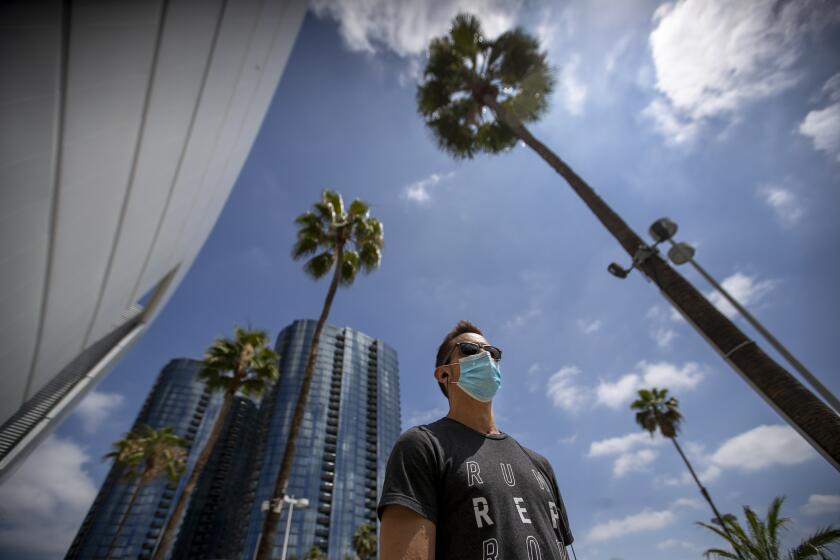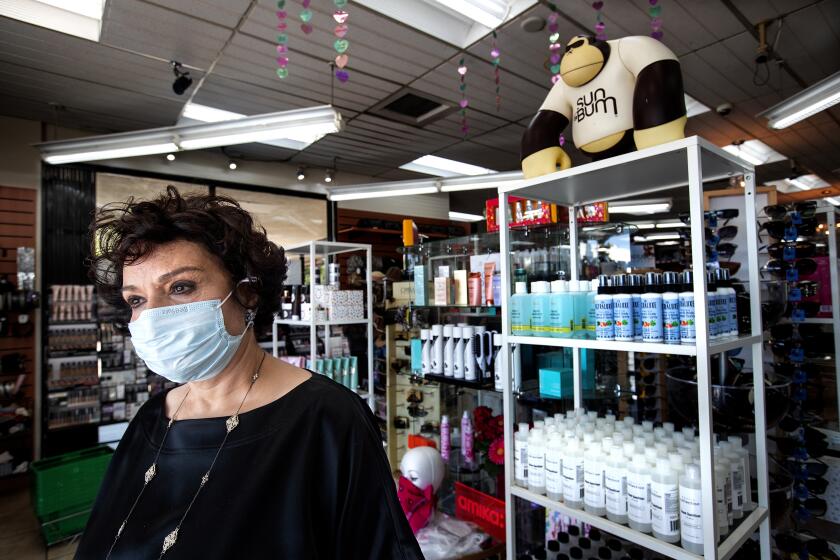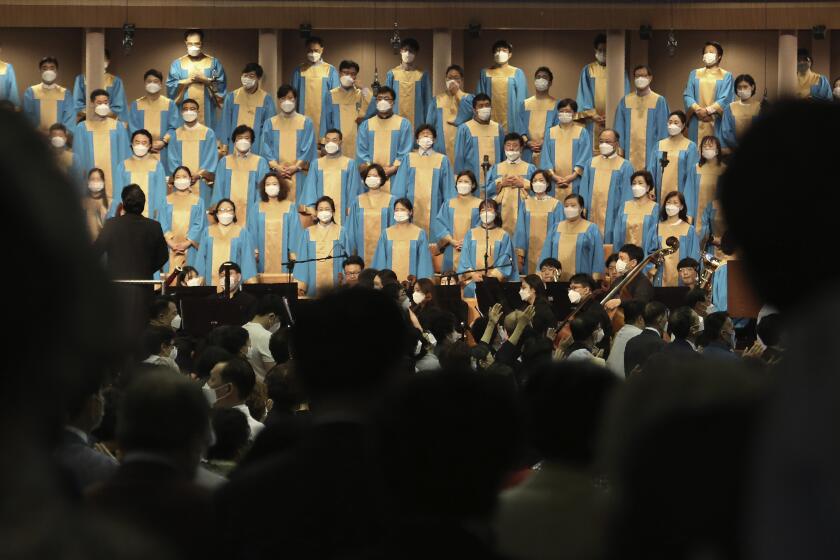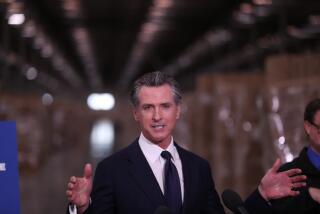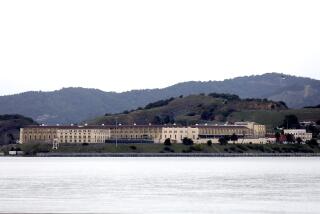Newsom vows crackdown on coronavirus scofflaws. Will law enforcement cooperate?
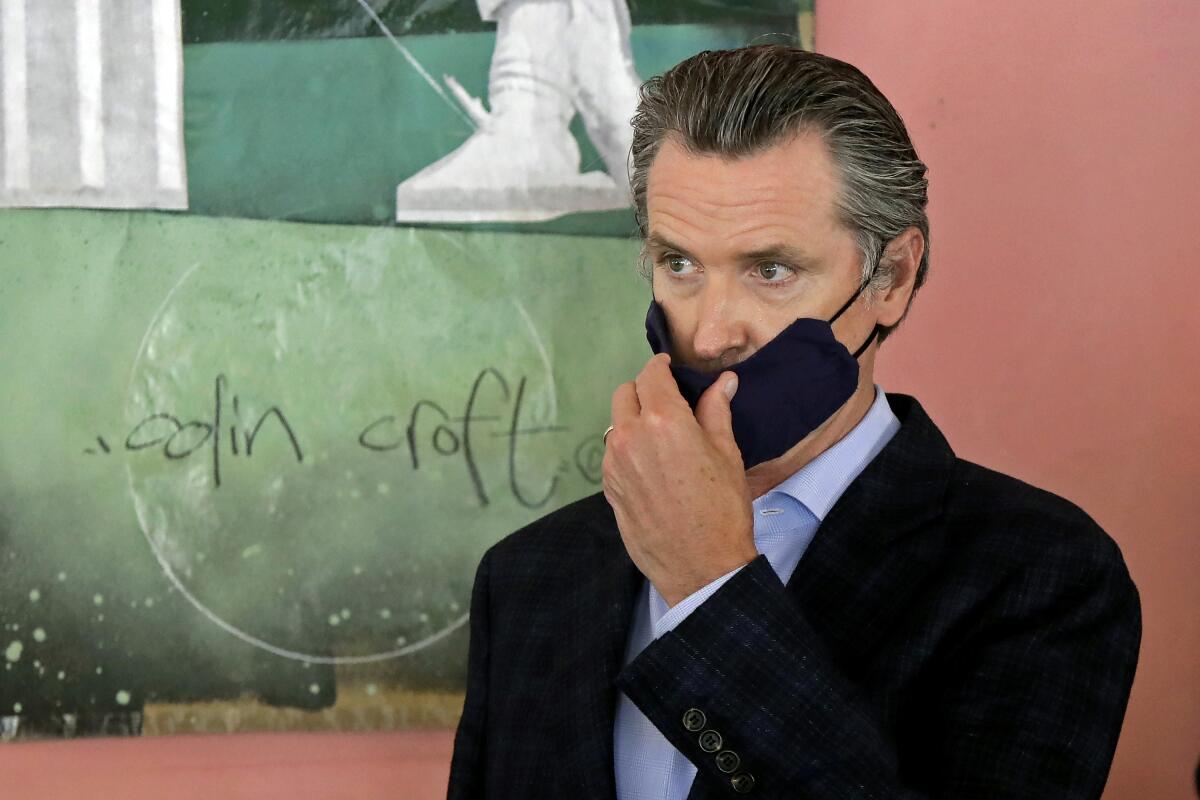
- Share via
SACRAMENTO — In April, Plumas County barber Steve Betts became one of the first Californians to face a criminal penalty for violating coronavirus health orders when he refused to close his two shops.
After local sheriff’s deputies warned him twice, they cited him on their third visit. Now, due back in court in August, he faces six months in jail and a $1,000 fine for each day he refused to shut down, he said.
“It just sucks, but at the same time I’m not sorry I did it,” said Betts, whose businesses have since been legally allowed to open.
“For them to just shut us down for no good reason other than (Gov. Gavin) Newsom ... it was more or less just games being played.”
Wednesday, as hospitalizations and positive tests for the virus skyrocket in many parts of the state, Newsom announced that it was once again closing time for bars, restaurants and other high-traffic businesses in 19 counties. And this time, he wasn’t playing games, though he acknowledged the challenge was real.
“Enforcement is a difficult one, and I am not naive about that ... not Pollyannish about it,” Newsom said.
Unlike past orders, when the governor largely stressed civic duty as the motivating force for compliance and left enforcement decisions in the hands of local governments, he turned up rhetoric on possible state crackdowns.
He announced “strike teams” from agencies that license barbers and bars, and the California Highway Patrol — one of the only California law enforcement agencies directly controlled by the state.
“We have I think a responsibility ... to go after people who are thumbing their noses, being aggressive, being reticent,” Newsom said.
But exactly what would additional enforcement in California mean? It is not entirely clear, and it has raised questions for local law enforcement, who have grappled from the start of the pandemic on their role.
While some law enforcement leaders have been stalwart in enforcing health orders, others have flat out refused.
The variety of responses highlights the local nature of policing and creates a quandary for state leaders who agree a unified message is vital to focus public attention.
Since shortly after the coronavirus outbreak began, Gov. Gavin Newsom has faced criticism from some over his ample use of executive authority during the COVID-19 pandemic.
“When it comes to something like this where it’s public-health related, that is new territory for law enforcement,” said Ed Obayashi, a Plumas County deputy and statewide law enforcement legal consultant.
The novel coronavirus, he said, is “like any other situation where we have discretion. We have discretion on minor violations of the law.”
Some local law enforcement officials, even in places hit hard by the virus, said they are doing fine without state help, and question whether intervention is needed.
“It’s always better to have the local entities approach the local businesses or people here,” said Imperial County Sheriff Raymond Loera.
Imperial County, in the southeast corner of the state, has seen an extreme outbreak in recent days and has had to transfer more than 500 patients to hospitals in other counties because of overload.
But Loera said that while he is uncertain why the virus has hit his region so hard, it is not because of local businesses’ lack of compliance or local law enforcement’s reluctance to enforce rules.
L.A. is prosecuting more than 70 businesses so far for allegedly flouting COVID-19 rules. The group includes pet groomers, salons and smoke shops.
Loera said his county borders both Mexico and Arizona, which lifted restrictions much earlier and has since seen a massive rise in cases, and sees large amounts of traffic from both.
It is also one of the poorest counties in the state, and is majority Latino — a demographic hit hard by the pandemic. Wednesday evening, the county increased its shutdown orders to include in-person church services and parks.
Still, only one bar on the Arizona border refused to close until deputies visited, Loera said.
“We responded and they complied,” he said. “None of this has been very confrontational.”
Now, Loera is uncertain what the new state efforts will mean. He and other local law enforcement leaders throughout California said they were not informed of the state effort prior to the public announcement.
“I anticipate that because we are one of the higher areas [for cases], that they will be here or very close,” he said. “And we need to know what they are doing.”
More than 200 researchers worldwide sign an open letter saying current guidance ignores evidence that the coronavirus readily spreads on microscopic particles known as aerosols that can hang in the air for long periods and float dozens of feet.
In San Bernardino County, also on the list of counties being watched by the state, Jodi Miller, spokesperson for the Sheriff’s Department, said her agency also has not faced compliance problems from local businesses.
“That’s really never been an issue for us,” Miller said. “We’ve been able to educate and get voluntary compliance.”
Ingrid Braun, the Mono County sheriff, whose county is not on the state watch list, said she believes that local authorities are best suited to handle enforcement because they know their communities, which are often tightly knit. Braun said that her county has also not seen mass defiance of orders, and like Imperial, had only a single bar that refused to close until deputies cited it.
Braun said she doesn’t write citations for health code violations such as not wearing a mask, but instead looks for more serious charges such as trespassing if a non-masked patron refuses to leave an establishment.
Braun said the state plan raised concerns from her because it might involve sending in people from out of the area, potentially exposing them to the virus or carrying it in.
“It’s not like you are sending them into a firefight where lives are at stake,” Braun said. “These are more theoretical lives ... and you are jeopardizing their lives by sending them in.”
But other agencies have taken a different tack, refusing to enforce orders. Sheriffs in counties including Sacramento, Riverside and Los Angeles have said they didn’t intend to enforce restrictions, and balked at Newsom’s past orders.
“It is time to reflect on decisions we have made under the pretext of this pandemic: Such as why we were forced to let over 1,100 inmates out of Sacramento’s COVID-free jail into a community where the law-abiding are still locked down?” wrote Sacramento Sheriff Scott Jones on Facebook on May 6.
“It is time to recognize that We the People have willingly acquiesced to loss of freedoms, loss of income, and loss of social connection for the greater good, but now we are ready to responsibly get back to life, liberty and the pursuit of happiness.”
State Sen. Richard Pan (D-Sacramento) this week proposed a bill that would keep the addresses of public health directors private, because some have faced threats based on unpopular health orders.
Pan said sheriffs need to be active in backing public health orders because they represent authority in their communities, but thinks some don’t for political reasons.
Across the county, masks and business closures have become political causes, with President Trump notably refusing to wear a mask.
“We’ve politicized our public health response,” said Pan. “You have sheriffs willing basically to not enforce the law.”
Some charge that politics are at play on all sides. The new guidance does not include churches, except to discourage singing and chanting. Houses of worship became flashpoints of defiance in California, including protests and the filing of lawsuits, after Newsom stopped in-person services for a time this spring. While those types of gatherings still violate health orders in many places, Newsom has been largely silent about them, while highlighting the dangers of gathering with family and friends.
Harmeet Dhillon, a lawyer who sued the administration about past closure orders, said via email Wednesday that the “situational ethics on what kinds of protests and businesses are acceptable” in California have given the orders “little credibility.”
Brian Ferguson, spokesman for the state Office of Emergency Services, which is coordinating the strike teams, said many of those involved have been focused on enforcement since the start of the pandemic, and the effort is meant to coordinate the work of multiple agencies — not expand it.
“This is really aimed at folks who are openly defiant,” he said. Ferguson said that businesses were the target of the effort, but didn’t rule out enforcement of the state’s mandate for mask-wearing in public spaces — which has yet to be legally enforced on a large scale. He added that outreach to local agencies, “is happening right now.”
But some see the tough talk as little more than that — an attempt by Newsom to scare compliance as the state teeters on the brink of an uncontrolled outbreak.
“Really I think his agenda is to get the public’s attention because all of these things ultimately hinge on voluntary compliance,” said Jack Pitney, a professor of government at Claremont McKenna College.
“There just aren’t enough law enforcement [officers] in California to force people to behave responsibly.”
More to Read
Sign up for Essential California
The most important California stories and recommendations in your inbox every morning.
You may occasionally receive promotional content from the Los Angeles Times.
